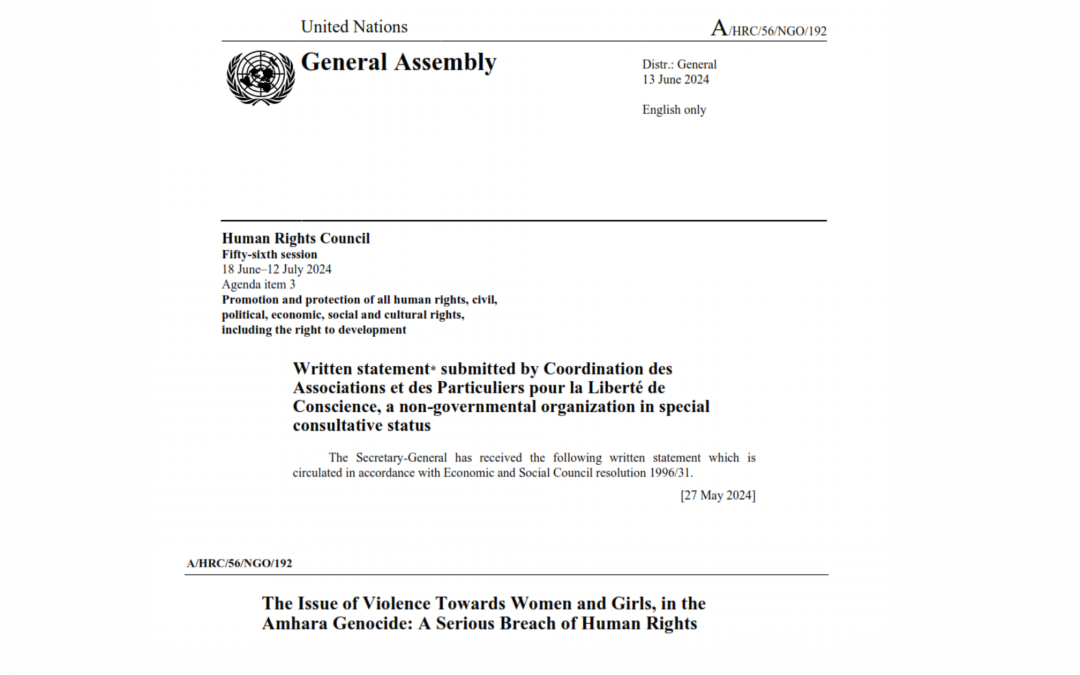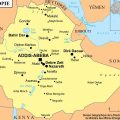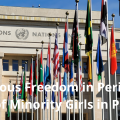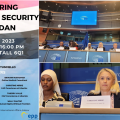The Coordination des Associations et des Particuliers pour la Liberté de Conscience a governmental organization with special consultative status has presented a written submission to the 56th session of the Human Rights Council shedding light on the serious human rights abuses taking place in Ethiopia especially targeting the Amhara community. The submission underscores the violence faced by Amhara women and girls framing it within a context of genocide against the Amhara people.
The document paints a picture of the crisis unfolding in Ethiopia with a focus on the organized violence against Amhara women and girls. This brutality is not seen as an infringement upon human rights but also as a deliberate tactic to destabilize Amhara society.
One alarming point raised in the submission is the accusation of cleansing and coerced sterilization. It alleges that authorities from TPLF have compelled Amhara women to undergo sterilization procedures without their consent or knowledge aiming to restrict the growth of the Amhara population. Furthermore it tragically reports incidents in Oromia and Benshangul Gumuz regions where pregnant Amhara women were brutally murdered along, with their babies.
Moreover attention is drawn to how rape’s being used as a tool of warfare.
Both the TPLF and the Prosperity Government are accused of permitting. Possibly even promoting their soldiers to use violence as a form of punishment, intimidation and harm, to the Amhara community. The victims of these brutalities vary from girls aged 8 to women aged 80 with incidents of group assaults, sexual mutilation and other types of severe violence. The lasting physical and mental effects of these crimes on the victims and their communities are highlighted.
Another significant concern raised is the displacement and abduction of Amhara children. Instances are described where Amhara families have been forcefully removed from their homes often witnessing the murder of their loved ones with their children being taken. The future of these children, who reportedly face brainwashing and forced labor is portrayed as a danger to the generation of the Amhara community.
The challenges faced by displaced Amhara individuals, women and children are also underscored. These displaced persons are depicted as being in circumstances lacking access to services, education and healthcare. It is mentioned that they often encounter obstacles in receiving aid and may be compelled at times to return to areas without proper security measures, in place.
The paper argues that all these actions, when looked at together amount to genocide against the Amhara people as outlined in the 1948 Convention, on Genocide Prevention and Punishment. It suggests that the organized nature of the violence forced displacements, child transfers and targeted assaults on women and girls indicate a planned effort to eradicate the Amhara group from society.
The statement urges decisive action from the community portraying the issue not just as a legal violation but as a moral necessity. It proposes using the Convention against Torture and Other Cruel, Inhuman or Degrading Treatment or Punishment as a basis for addressing these human rights abuses since Ethiopia’s a signatory to this convention.
The paper ends with a set of suggestions for the Human Rights Council to pressurize the government into taking steps. These recommendations include;
- Halting all forms of torture and mistreatment against Amhara women and girls.
- Conducting an unbiased inquiry, into the reported atrocities.
- Ensuring that Ethiopias legal system is capable of prosecuting and penalizing offenders.
- Introducing initiatives to offer social assistance to victims.
Measures need to be put in place to prevent atrocities by providing training making reforms and promoting human rights. The message stresses that failing to act will not prolong the suffering of the Amhara community but also create a dangerous precedent that undermines international law and universal human rights protection. This written statement submitted to the Human Rights Council highlights a situation, in Ethiopia focusing on the targeted violence against Amhara women and girls as part of a genocide pattern. It calls for attention and action framing the issue not only as a regional problem but also as a test of the global community’s dedication to human rights and preventing genocide. The document serves as an appeal, for justice and urgent intervention to safeguard the Amhara people and uphold human rights principles.






